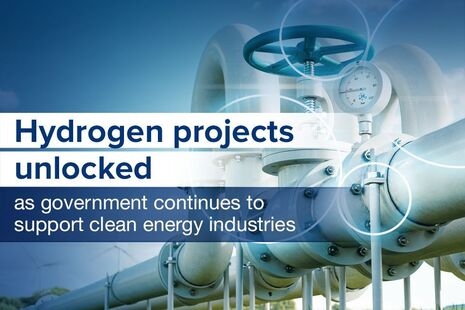10 projects from the first phase of the government's flagship hydrogen programme can begin construction.
In an update to the hydrogen market, the government has confirmed that 10 projects from the first phase of its flagship hydrogen programme – Hydrogen Allocation Round (HAR1) – can begin construction, supporting the government’s mission to become a clean energy superpower.
This means spades can now enter the ground across the country in a major boost to the UK’s hydrogen industry, creating highly skilled jobs in industrial cities and regions such as South Wales, Bradford (North West), North Scotland and Teesside (North East).
These projects will support British industry to move away from using fossil fuels towards domestically-produced low-carbon hydrogen, reducing emissions heavy industry - such as steel, glass and heavy transport - ensuring decarbonisation is a route to reindustrialisation.
The HyMarnham project in Newark, Nottinghamshire has already started construction. The project is transforming the old High Marnham coal-fired power station into a clean energy hub by using hydrogen to decarbonise waste disposal operations.
Cromarty Hydrogen Project in Northeast Scotland is another of the 10 projects. The project’s 3 5MW electrolysers – which use electricity to split water into hydrogen and oxygen – will power local industrial users, including distilleries.
Taken together, the projects are expected to create over 700 jobs, including roles for apprentices, graduates, pipefitters and engineers. They are also expected to bring in over £400 million of private capital investment which has been committed between 2024 and 2026 – driving economic growth and British innovation through the Plan for Change.
The update comes as Andrex and Kleenex producer Kimberly-Clark announces that it will be the first major consumer goods company in the UK to make a significant commitment to green hydrogen. Kimberly-Clark, together with energy partners HYRO, Carlton Power, and Schroders Greencoat, will invest a combined £125 million into HAR1 projects at two plants in Barrow-in-Furness, Cumbria and Northfleet, Kent.
Minister for Industry, Sarah Jones, said: "This government is rolling out hydrogen out at scale for the first time, with 10 of the first projects now shovel-ready to start powering businesses with clean, homegrown energy from Teesside to Devon. Hydrogen will help us cut industrial emissions and support Britain’s industrial renewal by creating thousands of jobs in our industrial heartlands as part of the Plan for Change."
Neil McDermott, Chief Executive of Low Carbon Contracts Company (LCCC), said: "LCCC is proud to have signed the UK’s first Low Carbon Hydrogen Agreements, supporting the development of projects under the Hydrogen Production Business Model. These agreements provide revenue stability for producers, and a clear signal that low-carbon hydrogen has a key role to play in the UK’s future energy system. We look forward to working closely with project developers to bring these projects into operation."
Dan Howell, Managing Director at Kimberly-Clark UK & Ireland said: "We are delighted to be the first UK consumer goods manufacturer to really embrace green hydrogen, showing that manufacturing industries can take the lead and overcome the technical challenge and adopt green hydrogen at scale. This initiative builds on the investments and progress we’ve already made with innovative technologies for our business, our consumers and our customers."
Today’s announcement follows the Spending Review which saw an extra £500 million confirmed for the first ever hydrogen transport and storage network as part of Britain’s industrial renewal, connecting hydrogen producers with vital end users, including power stations and industry for the first time.
The government has also announced that it will consult on transmission-level hydrogen blending – assessing the economic and technical feasibility for hydrogen to be blended into the networks that are the backbone of Britain’s gas system, before it is safely transported into homes and businesses.
Hydrogen transmission blending has the potential to reduce costs for hydrogen production projects and the wider energy system, and the consultation will also gather evidence to assess whether hydrogen blending could lower consumers’ energy bills.
- 8 views

